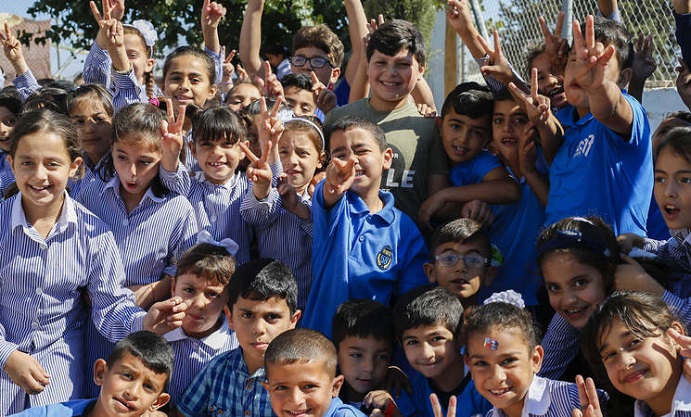Colum Lynch
Foreign Policy / November 6, 2019
Trump’s aid cuts posed an existential threat to the U.N. agency charged with caring for millions of Palestinians. Now, the agency is grappling with its own management crisis.
Pierre Krähenbühl, the Swiss commissioner-general of the United Nations Relief and Works Agency for Palestine Refugees, resigned Wednesday, following a pair of critical inquiries into his management of the beleaguered aid agency.
It was only the latest bad news for the agency, which in recent years has come under attack from the Americans and Israelis. The White House and Israeli Prime Minister Benjamin Netanyahu have denied that most Palestinians recognized by UNRWA as refugees deserve refugee status and rights. They have pressed the Palestinians’ Arab neighbours, who have hosted millions of Palestinian refugees within their borders for generations, to absorb them as their own citizens. They have also advocated dismantling the U.N. agency, despite concerns by the Israel Defense Forces and U.S. national security agencies that
Last year, U.S. President Donald Trump’s son-in-law and Middle East advisor, Jared Kushner, spearheaded an effort to end more than $360 million in annual funding to the agency, saying it “perpetuates a status quo, is corrupt, inefficient and doesn’t help peace.” He proposed “an honest and sincere effort to disrupt UNRWA.”
Krähenbühl, who previously served as director of operations at the International Committee of the Red Cross before his March 2014 appointment to lead UNRWA, succeeded in restoring most of the lost funding last year from European and Arab governments. But the agency is currently back in the red, facing a deficit of some $89 million in funding. In addition, some $50 million in core budget funds provided last year by the Persian Gulf states has not been paid this year.
But an ethics report’s findings set back that effort, prompting several donors, including Belgium, Switzerland, and the Netherlands, to freeze funding to the agency, pending the completion of the report from the U.N.’s Office of Internal Oversight.
The development represented another setback for the United Nations, which has strained to demonstrate to donors that their money is being well spent.
Krähenbühl’s decision to step down came just hours after U.N. Secretary-General António Guterres placed him on administrative leave, pending the completion of an internal U.N. investigation into allegations of mismanagement by the refugee official and his top advisors. Guterres appointed Christian Saunders to serve as the refugee agency’s officer in charge.
Guterres issued a statement saying that an internal U.N. investigation into Krähenbühl’s management of UNRWA ruled out any suggestion that he engaged in “fraud or misappropriation of operational funds.” But the investigation found “managerial issues that need to be addressed,” and the statement said he would be placed on leave “while those issues are further clarified so that a final determination can be made, and any appropriate action can be taken.”
In his letter of resignation, which was obtained by Foreign Policy, Krähenbühl wrote, “I am taking this decision … in the firm belief that this is in the best interest of Palestine refugees, of my family and myself. A further delay would only benefit those who have so actively engaged in political, financial and personal attacks over the past two years with the declared objective to undermine UNRWA and the integrity of Palestine refugees.”
The announcement comes more than three months after the Qatar-based news agency Al Jazeera reported that the U.N. agency’s ethics office issued a report alleging “credible and corroborated reports” that Krähenbühl’s “inner circle” committed “abuses of authority for personal gain, to suppress legitimate dissent and to otherwise achieve their personal objectives.”
The ethics probe examined the conduct of Krähenbühl and three other officials who worked in his front office. It cited allegations that a senior aide used her influence to employ her husband at the U.N. agency. Another top aide was alleged to have abused his authority by mistreating staff, including by “defaming” a U.N. driver who had filed a complaint against him and other staffers. Those two officials—who denied wrongdoing—have since left UNRWA.
Krähenbühl, who also denied wrongdoing and had vowed to remain at his job until the investigation was concluded, was faulted for improperly providing benefits, including waivers permitting first-class travel to a subordinate who frequently accompanied him on travels. Their relationship, according to officials interviewed by the ethics office, went “beyond the professional.”
The ethics report concluded that the activities posed “an enormous risk to the U.N.” and “their immediate removal should be carefully considered.” It also triggered the full-blown investigation into Krähenbühl’s management of UNRWA by the Office of Internal Oversight, which just concluded a preliminary report clearing the Swiss official of the most serious charges but raising concerns about his management of the organization.
In his resignation letter, Krähenbühl noted that the U.N. chief’s office had assured him that the ongoing investigation “did not concern the unfounded allegation that I entertained a romantic relationship with a staff member, an allegation that I have consistently rejected. From earlier communications, it had already been established that no concerns of fraud, corruption or mismanagement of donor funds were identified.”
He also received assurances, he added, that the final phase of the investigation would focus on “recruitment” and “certain management issues.”
“I state clearly here that my decision is not in acquiescence to any of the allegations against me,” he wrote. “Far from it. I continue to firmly and unreservedly reject them, and to reiterate that every decision I have taken as head of agency has been based on ethical considerations.”
UNRWA was established in 1949 to provide relief and protection for more than 700,000 Palestinians displaced from what is now Israel during the Arab-Israeli War. But the relief agency, which now runs schools and provides health and other social services to more than 5 million refugees in Gaza, the West Bank, Jordan, Lebanon, and Syria, has faced increasing criticism from Israel, the White House, and pro-Israel lawmakers.
Krähenbühl’s resignation could help the U.N. persuade donors to restore funding to the agency. But it also added fuel to efforts by Israel and the United States to dismantle the aid agency.
“These findings strengthen Israel’s claims that a comprehensive change in the operational model of UNRWA is required,” Yuval Rotem, the director-general of Israel foreign ministry, tweeted Wednesday. “I urge the International community to create a new and more effective model.”
Colum Lynch is a senior staff writer at Foreign Policy













